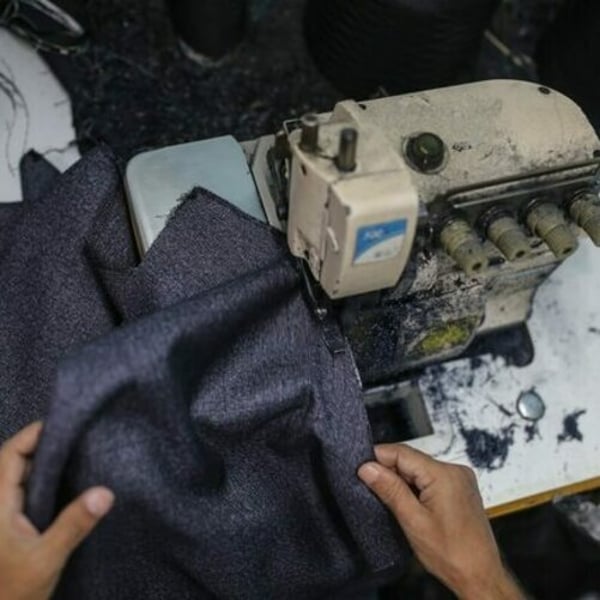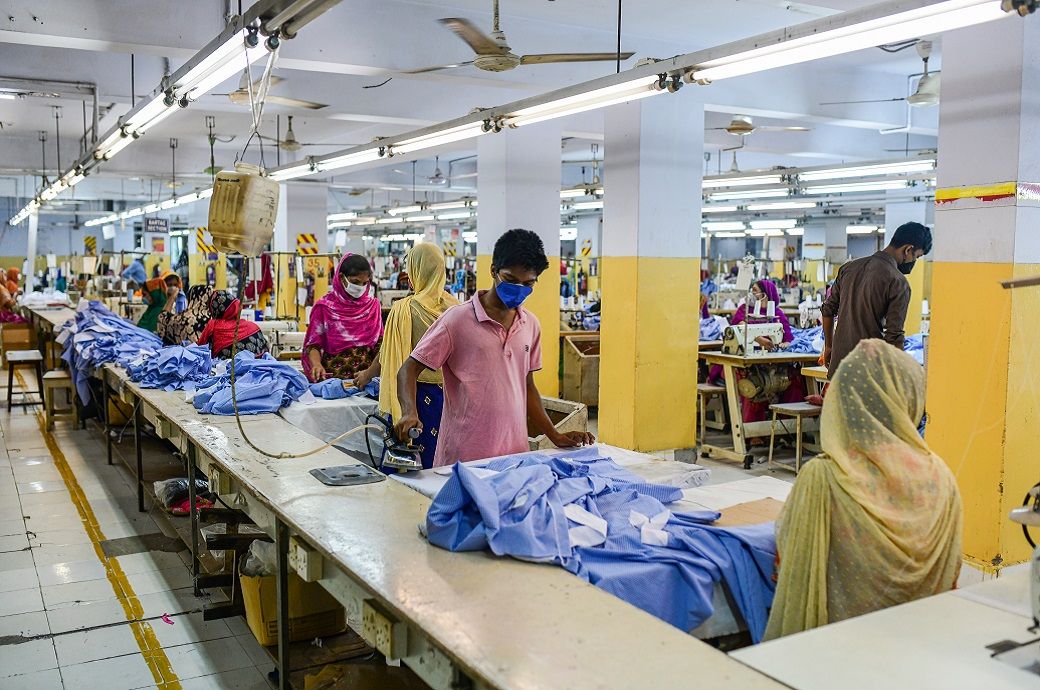Fashion
Indian exporters look to expand in Africa to dodge 50% US tariff

By
Bloomberg
Published
August 31, 2025
Indian businesses are looking to expand production in Africa for exporting to the US, after President Donald Trump hit the South Asian nation with one of the steepest levies globally as punishment for purchases of Russian oil.
Gap Inc. supplier Gokaldas Exports Ltd. and premium garments maker Raymond Lifestyle Ltd. are among the companies planning to leverage tariffs of as low as 10% in some African countries, compared to the 50% levy on Indian exports. Diamond and jewelry exporters are also looking into expanding on the continent.
Indian companies are scrambling to offset the pain from US tariffs and looking for workarounds to continue servicing their American clients. Labor-intensive sectors like jewelry and apparel are the hardest hit and US levies may reduce exports of certain goods by as much as 90%, according to a note from Bloomberg Economics this week.
Overall exports from India to the US, its biggest market, may more than halve after the higher tariffs that kicked in on Wednesday, it added. India exported more than $20 billion of textile products, jewelry and diamonds to the US in 2023.
“We will continue to expand in Africa in case of 50% tariffs,” Gokaldas Exports’s Managing Director Sivaramakrishnan Ganapathi said in a phone interview, even as he expects the tariff issue between US and India to settle down soon. The apparel exporter has four factories in Kenya and one in Ethiopia. Both these nations face 10% US tariffs.
Meanwhile, Raymond Lifestyle is negotiating with its American customers to ship more merchandise out of the company’s Ethiopia plant to alleviate the tariff pain. “We can obviously shift some of the clients to the Ethiopian factory,” Chief Financial Officer Amit Agarwal told Bloomberg.
Dharmanandan Diamonds, a gems exporter based in western Indian city of Surat, will consider boosting production in Botswana if US continues with high tariffs, Reuters reported citing the company’s Managing Director Hitesh Patel.
Africa has emerged as a viable alternative after Indian firms begun exploring sweeter tariff spots overseas for servicing the US market. Some countries in the continent — such as Ethiopia, Nigeria, Botswana, and Morocco — already give incentives such as tax holidays, apart from customs duty and VAT exemptions. Some are promising sector-specific initiatives and building special economic zones to attract investments.
“African governments are offering compelling incentives such as tax breaks, land concessions, and regulatory facilitation to attract investment in manufacturing and technology transfer,” said Soumya Bhowmick, a fellow at Observer Research Foundation, adding that the trade developments have created a “unique arbitrage opportunity.”
To be sure, any shift in manufacturing operations to the continent will be time consuming as Indian companies need to renegotiate terms with US buyers, even as they see orders deferred or canceled.
Some US customers are not very comfortable taking deliveries from Ethiopia fearing disruptions from potential conflicts, even though labor costs are about a third of India’s, according to Agarwal.
That could change as India loses its competitive advantage with these tariffs, he added.
Fashion
World growth to ease to 2.6% in 2026, rise to 2.7% in 2027: World Bank

Global growth is projected to remain broadly steady over the next two years, easing to 2.6 per cent in 2026 before rising to 2.7 per cent in 2027, an upward revision from the June forecast.
World economy is proving more resilient than anticipated despite persistent trade tensions and policy uncertainty, the World Bank said.
Global growth is projected to stay broadly steady over the next two years, easing to 2.6 per cent in 2026 before rising to 2.7 per cent in 2027.
Global inflation is projected to edge down to 2.6 per cent in 2026, reflecting softer labour markets and lower energy prices.
The resilience reflects better-than-expected growth, especially in the United States, which accounts for about two-thirds of the upward revision to the forecast in 2026.
Even so, if these forecasts hold, the 2020s are on track to be the weakest decade for global growth since the 1960s.
The sluggish pace is widening the gap in living standards across the world, the report says.
In 2025, growth was supported by a surge in trade ahead of policy changes and swift readjustments in global supply chains. These boosts are expected to fade in 2026 as trade and domestic demand soften.
However, the easing global financial conditions and fiscal expansion in several large economies should help cushion the slowdown, a World Bank release said citing the report.
Global inflation is projected to edge down to 2.6 per cent in 2026, reflecting softer labour markets and lower energy prices.
Growth is expected to pick up in 2027 as trade flows adjust and policy uncertainty diminishes.
In 2026, growth in developing economies is expected to slow to 4 per cent from 4.2 per cent in 2025 before edging up to 4.1 per cent in 2027 as trade tensions ease, commodity prices stabilise, financial conditions improve and investment flows strengthen.
Growth is projected to be higher in low-income countries, reaching an average of 5.6 per cent over 2026-27, buoyed by firming domestic demand, recovering exports and moderating inflation.
However, this will not be sufficient to narrow the income gap between developing and advanced economies.
Per capita income growth in developing economies is projected to be 3 per cent in 2026—about a percentage point below its 2000-2019 average.
At this pace, per capita income in developing economies is expected to be only 12 per cent of the level in advanced economies.
These trends could intensify the job-creation challenge confronting developing economies, where 1.2 billion young people will reach working age over the next decade, according to the World Bank.
Fibre2Fashion (DS)
Fashion
Budget should strengthen India’s textile & apparel industry: CITI

The Confederation of Indian Textile Industry (CITI) expects the upcoming Budget to futureproof India’s textile and apparel sector through measures that will make the arena more resilient, innovative, and globally competitive.
CITI has urged the Union Budget to futureproof India’s textile and apparel sector through reforms on raw material pricing, competitiveness, sustainability and trade facilitation.
Seeking duty-free cotton, technology and green schemes, and export support, CITI said that high US tariffs threaten jobs in a sector vital to GDP, exports and livelihoods.
“Our optimism that the forthcoming Union Budget will significantly move the needle on policy and regulatory reforms is bolstered by the government’s steadfast commitment to the growth and development of India’s textile and apparel sector,” CITI chairman Ashwin Chandran said.
“The Budget enabling the creation of a stronger growth ecosystem for the Indian textile and apparel sector can also have a positive ripple effect on the Viksit Bharat (developed India) goal,” Chandran added.
India’s textile and apparel sector is the second-largest provider of jobs and livelihoods in the country. It is also a significant contributor to the country’s GDP and exports.
Some of the specific measures that the Confederation of Indian Textile Industry (CITI) would like to see in the coming Budget are:
1. Raw material and price stability-related:
- Removal of import duty on all varieties of cotton fibre.
- Change in MSP formula for cotton to align with international benchmark prices.
- Launch of a Cotton Price Stabilisation Fund.
- Ensure availability of man-made fibres (MMF) at globally competitive prices.
2. Competitiveness, technology, and sustainability-related:
- Launch of a Green Technology Scheme to support MSMEs’ transition to clean energy and sustainable practices.
- Launch of an alternative scheme to the erstwhile Technology Upgradation Fund Scheme.
- Launch of a scheme to promote indigenous textile machinery manufacturing.
- Address high power costs and industrial cross-subsidies.
- Establishment of a National Textile Fund.
3. Trade Facilitation-related
- Extension of RBI’s Trade Relief Measures to cover the entire textile value chain.
- Increase in Basic Customs Duty on all types of knitted fabric to curb imports at unviable prices.
- Reintroduction of the MEIS Scheme.
- Extension of the facility of Duty-free Import of specified items/goods to exporters of made-ups.
“Combined, these measures could increase the resilience of India’s textile and apparel sector and help it become a more powerful force globally, while also contributing towards realising the national target of creating a $350 billion textile and apparel industry in India by 2030,” Chandran said.
India’s textile and apparel sector has been hit hard by the 50 per cent US tariff on Indian goods, effective August 27, 2025. The steep US tariff has adversely affected numerous Indian textile and apparel companies, thereby increasing the risk that millions of people working in this sector may lose their jobs and livelihoods.
The US is the single-largest market for India’s textile and apparel exports, contributing almost 28 per cent to the total revenue of the country’s textile and apparel exporters. India’s exports of textile and apparel products to the US were valued at nearly $11 billion in the fiscal year 2024-25.
“India’s textile and apparel exporters have stepped up their diversification efforts, but it is tough to quickly make up for potential business losses in the US. Also, while existing and upcoming FTAs would create new opportunities for India’s textile and apparel sector, these benefits will require time to materialise,” Chandran said.
Fibre2Fashion News Desk (HU)
Fashion
BGMEA, ActionAid join hands for Bangladesh RMG industry transformation
-

 Tech1 week ago
Tech1 week agoNew Proposed Legislation Would Let Self-Driving Cars Operate in New York State
-

 Entertainment7 days ago
Entertainment7 days agoX (formerly Twitter) recovers after brief global outage affects thousands
-

 Sports5 days ago
Sports5 days agoPak-Australia T20 series tickets sale to begin tomorrow – SUCH TV
-

 Fashion3 days ago
Fashion3 days agoBangladesh, Nepal agree to fast-track proposed PTA
-

 Business4 days ago
Business4 days agoTrump’s proposed ban on buying single-family homes introduces uncertainty for family offices
-

 Politics3 days ago
Politics3 days agoSaudi King Salman leaves hospital after medical tests
-

 Tech4 days ago
Tech4 days agoMeta’s Layoffs Leave Supernatural Fitness Users in Mourning
-

 Tech5 days ago
Tech5 days agoTwo Thinking Machines Lab Cofounders Are Leaving to Rejoin OpenAI



















